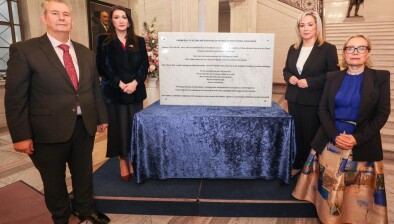NI: Employment tribunal affirms Prohibition Notice issued to Asbestos-removal Company for contravening health and safety legislation
An Employment Tribunal unanimously dismissed an appeal brought by an asbestos removal company, and affirmed the Prohibition Notice issued by the Health & Safety Executive for Northern Ireland (HSENI) due to the company’s contravention of statutory provisions governing asbestos removal that heightened the personal injury risks at the site.

About this case:
- Judgment:
Cullen Asbestos Limited, licensed by HSENI to carry out asbestos removal, sought to appeal a Prohibition Notice issued upon it on 3 December 2015. A three-member employment tribunal consisting of Employment Judge Drennan QC, Mr H Stevenson, and Mr J Law heard the appeal in August 2016.
Cullen Asbestos was contracted to perform asbestos removal works at a site at 90 Ballybarnes Road, Newtownards, by the principal building contractor, Gareth Roddy, who was engaged by the owner of the site to undertake the refurbishment and extension of premises. The work included the demolition of outbuildings, all of which contained asbestos and one contained licensed asbestos.
Prohibition Notice
On 3 December 2015, the asbestos removal works at the site were substantially completed and were awaiting a ‘four stage clearance’ by the independent analyst. Dr Rowland Jones and Ms Kellie McNamara carried out an inspection of the site on this day, and issued the contested Prohibition Notice during the course of the inspection.
The Prohibition Notice issued on 3 December 2015 under Article 24 of the Health & Safety at Work (Northern Ireland) Order 1978, stated that the removal of asbestos work at the site “will involve, a risk of serious personal injury” due to insufficient power to operate the main decontamination unit (DCU) and negative pressure unit (NPU) on site at time of inspection.
This was in contravention of the Control of Asbestos at Work (NI) Regulations 2012 because ‘the DCU could not be used whilst the NPU and ancillary equipment was switched on’.
The Prohibition Notice also stated that the said activities could not be carried on unless the contraventions had been remedied, and that the measures specified in the Schedule, which formed part of the Prohibition Notice, required to be taken to remedy the said contraventions or matters.
Approximately two hours after the Prohibition Notice was issued, Mr Cullen, who had not been present on the site at the time of the visit of Dr Jones and Ms McNamara, contacted Dr Jones and told him the full mains electricity had been restored to the site and assured Dr Jones this meant the DCU and NPU could both be fully working at the same time.
Dr Jones accepted, at face value, what Mr Cullen had said to him and did not ask him for further details on how this had been achieved. Consequently, he did not consider it necessary for him and/or Ms McNamara to re-visit the site.
Dr Jones was satisfied, in light of what he was told by Mr Cullen, the measures required to remedy the contraventions set out in the Prohibition Notice had now been complied with and work could therefore be resumed on site.
Tribunal Hearing
The tribunal was not satisfied with evidence provided by the main contractor of the site and consequently dismissed statements made by him. Similarly, the tribunal was critical of the inconsistent statements made by an employee of Cullen Asbestos who had been present during the inspection.
In reaching its decision, “the tribunal was fully aware that it was not limited to reviewing the genuineness and/or the reasonableness of the inspector’s opinion but rather was required to form its own view, paying due regard to the expertise of the inspector” as per Railtrack v Smallworld ICR 714; and to determine the risk at the relevant time of the inspection on 3 December 2015, when the Prohibition Notice was issued.
The tribunal was satisfied that the inspectors’ evidence regarding the absence of power to the DCU at the time of inspection was correct, and having due regard to the expertise of the inspectors, it concluded that it would have reached the same decision and issued a Prohibition Notice, when faced with a similar situation.
According to the statutory provisions, the DCU is required to be fully operational before any other work begins, which includes clearance by a UKAS accredited analyst.
Given the absence of power, that there was a reasonably foreseeable risk of exposure to asbestos to those on the site, given the well-known dangers and serious consequences of health of any exposure of asbestos.
In the situation as found by the inspectors – with no power to the DCU; with the analyst due to arrive to carry out the relevant four stage clearance; and three employees working in the vicinity of the enclosure – the tribunal was satisfied there was a risk of serious personal injury.
Hindsight Evidence
Employees of Cullen Asbestos attempted to suggest there had been, at the time of the inspection, an alternative power supply for the DCU from the mains power supply at the farmhouse; but this was not what the inspectors saw at the time of their inspection or indeed were told to them by Mr Adams at the time of the inspection.
Given the fact Mr Adams did not make any mention of this alternative power source for the DCU, the inspectors could not have known or being expected to know of it.
The tribunal concluded that the subsequent evidence given at the hearing by aforementioned employees was what, ‘with hindsight’, should have been done rather than what was actually the position at the time of the inspection.
Following Chilcott v Thermal Transfer Ltd EWHC 2086 and HM Inspector of Health & Safety v Chevron North Sea Ltd CSIH 29, ‘hindsight evidence’ cannot be taken into account in assessing the relevant risk and the tribunal therefore did not do so.
The Prohibition Notice, dated 3 December 2015, issued by HSENI, was therefore affirmed.









